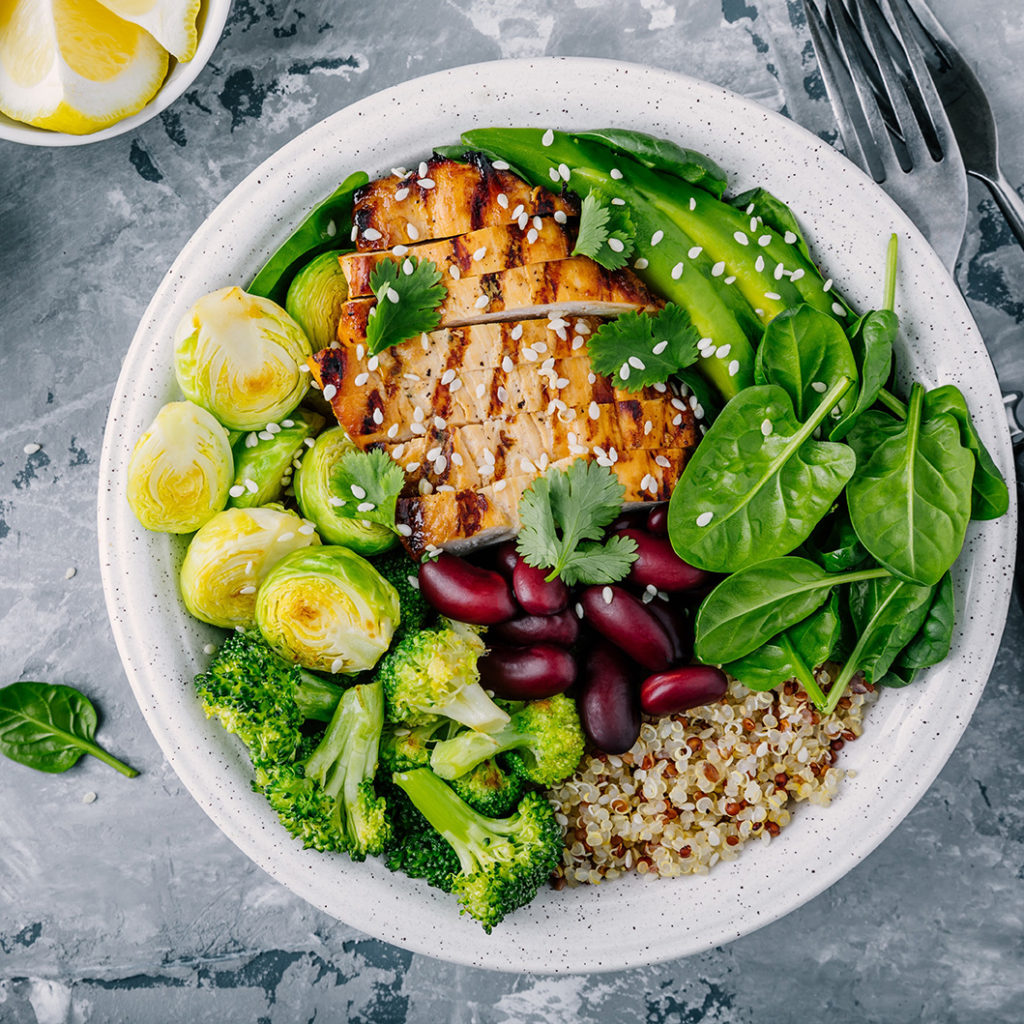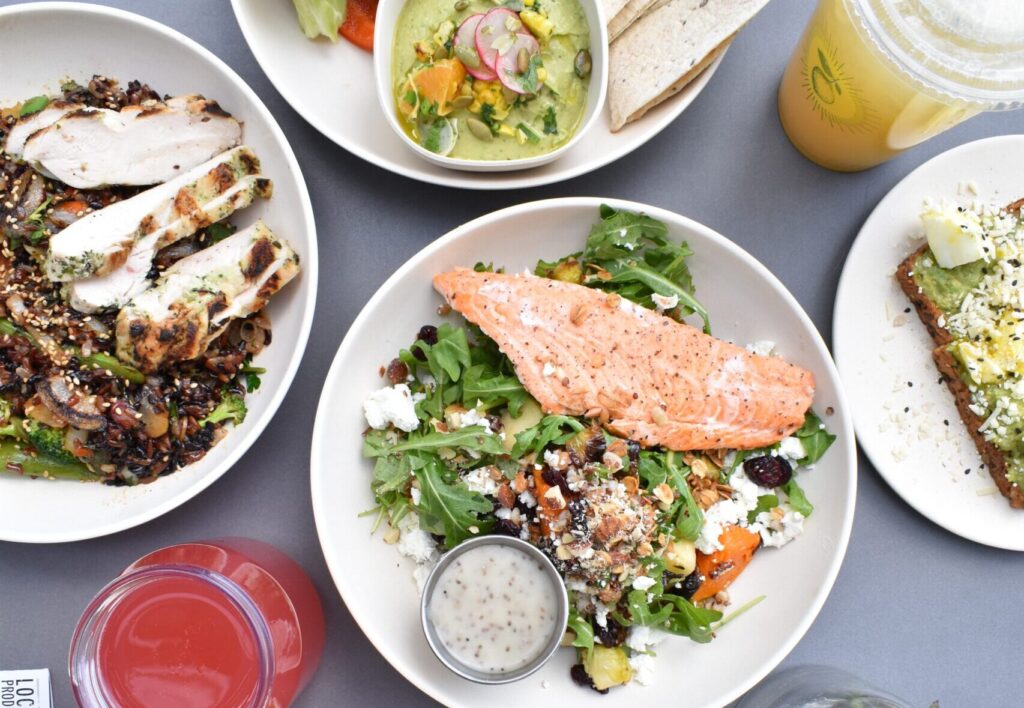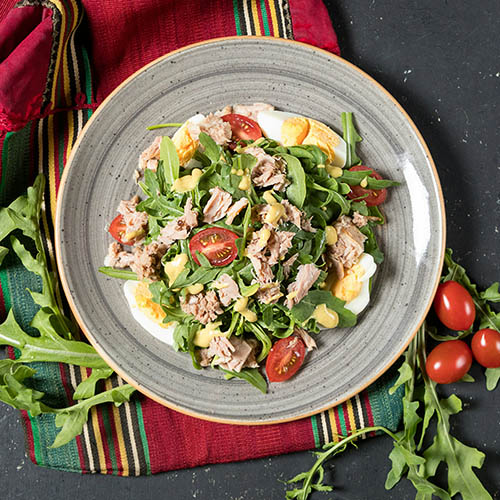What’s the simplest, no-brainer way to eat healthy, even when delicious holiday treats are all around you? First, let me ask you this:
How many of the foods you eat in a week have you had more times than you can count?
Unless you’re a professional food critic or a host on Top Chef, you probably eat many of the same things day in and day out. Even if you go out to dinner somewhere new, your breakfast and lunch are likely to be routine.
So if you made your go-to foods a little healthier over time, that would start to stack up big. What does that mean exactly?
- You swap a banana for breakfast with banana overnight oats
- You swap a turkey wrap for lunch with turkey breast and veggies
- You make your go-to foods higher in protein, lower in calories, and more filling overall
A little knowledge of the foods that help your muscles and metabolism without being super high in calories goes a long way.
I call these High Performance Foods. You don’t have to track everything all the time. Just eat more of these foods more often, and you can maintain your energy and a body you like, while still having special meals out.

High Performance Foods: Protein
Here is a list of 30 proteins arranged from highest protein to least protein. Per 100 calories you can see how many grams of protein each yields. Click the list to expand or hide.
- Chicken Breast: 22 grams of protein per 100 calories
- Tuna: 22 grams
- Egg Whites: 22 grams
- Turkey Breast: 20 grams
- Shrimp: 20 grams
- Cod: 20 grams
- Whey Protein: 20 grams
- Lean Beef: 18 grams
- Pork Loin: 17 grams
- Non-Fat Greek Yogurt: 15 grams
- Cottage Cheese: 14 grams
- Low-Fat Cottage Cheese: 12 grams
- Greek Yogurt: 10 grams
- Tofu: 10 grams
- Tempeh: 9 grams
- Edamame: 8 grams
- Lentils: 8 grams
- Chickpeas: 7 grams
- Black Beans: 7 grams
- Soy Milk: 6 grams
- Eggs: 6 grams
- Mozzarella Cheese: 6 grams
- Cheddar Cheese: 6 grams
- Peas: 6 grams
- Milk: 5 grams
- Almonds: 4 grams
- Peanut Butter: 4 grams
- Quinoa: 4 grams
- Whole Wheat Bread: 4 grams
- Sunflower Seeds: 3 grams
High Performance Veggies

Here is a list of 30 Vegetables arranged from least energy-dense to most energy-dense, with their respective calorie content for a 300-gram serving:
- Cucumber: 45 calories
- Lettuce: 45 calories
- Celery: 45 calories
- Radishes: 48 calories
- Zucchini: 51 calories
- Tomatoes: 54 calories
- Asparagus: 60 calories
- Mushrooms: 66 calories
- Bell Peppers: 69 calories
- Pumpkin: 69 calories
- Spinach: 69 calories
- Eggplant: 75 calories
- Cabbage: 75 calories
- Cauliflower: 75 calories
- Green Beans: 93 calories
- Fennel: 93 calories
- Broccoli: 93 calories
- Carrots: 123 calories
- Brussels Sprouts: 126 calories
- Beets: 129 calories
- Onions: 132 calories
- Kale: 147 calories
- Leeks: 180 calories
- Artichokes: 192 calories
- Potatoes: 231 calories
- Peas: 252 calories
- Sweet Potatoes: 258 calories
- Butternut Squash: 294 calories
- Corn: 297 calories
- Parsnips: 300 calories
High Performance Fruits
Here is a list of 20 fruits arranged from least energy-dense to most energy-dense, with their respective calorie content for a 200-gram serving:
- Watermelon: 60 calories
- Strawberries: 64 calories
- Cantaloupe: 68 calories
- Peach: 78 calories
- Papaya: 86 calories
- Plums: 92 calories
- Oranges: 94 calories
- Pineapple: 100 calories
- Raspberries: 104 calories
- Apples: 104 calories
- Blueberries: 114 calories
- Pears: 114 calories
- Mango: 120 calories
- Kiwi: 122 calories
- Cherries: 126 calories
- Grapes: 138 calories
- Figs: 148 calories
- Pomegranate: 166 calories
- Bananas: 178 calories
- Avocado: 320 calories
High Performance Starches
Here is a list of 15 starches, ordered from least energy-dense to most energy-dense, based on a consistent serving size of 200 grams:
- Zucchini noodles: 40 calories
- Spaghetti squash: 62 calories
- Acorn squash: 80 calories
- Butternut squash: 90 calories
- Oatmeal: 142 calories
- White potato: 154 calories
- Sweet potato: 172 calories
- Brown rice: 222 calories
- Couscous: 224 calories
- Quinoa: 240 calories
- Whole wheat pasta: 248 calories
- White rice: 260 calories
- Regular pasta: 262 calories
- Whole wheat bread: 494 calories
- White bread: 532 calories


Upgrade Your Common Foods
Proteins
Per 100 calories you can see how many grams of protein each yields
- Chicken Breast: 22 grams
- Tuna: 22 grams
- Egg Whites: 22 grams
- Turkey Breast: 20 grams
- Shrimp: 20 grams
- Whey Protein: 20 grams
- Lean Beef: 18 grams
- Pork Loin: 17 grams
- Non-Fat Greek Yogurt: 15 grams
- Low-Fat Cottage Cheese: 12 grams
Veggies
Per 300 grams you can see how many calories each one yields. You can eat more with fewer calories the higher up the list you go.
- Cucumber: 45 calories
- Lettuce: 45 calories
- Celery: 45 calories
- Radishes: 48 calories
- Zucchini: 51 calories
- Tomatoes: 54 calories
- Asparagus: 60 calories
- Mushrooms: 66 calories
- Bell Peppers: 69 calories
- Canned Pumpkin: 69 calories
Fruits
Per 200 grams you can see how many calories each one yields. You can eat more with fewer calories the higher up the list you go.
- Watermelon: 60 calories
- Strawberries: 64 calories
- Cantaloupe: 68 calories
- Peach: 78 calories
- Papaya: 86 calories
- Plums: 92 calories
- Oranges: 94 calories
- Pineapple: 100 calories
- Raspberries: 104 calories
- Apples: 104 calories
Starches
Per 200 grams you can see how many calories each one yields. You can eat more with fewer calories the higher up the list you go.
- Zucchini noodles: 40 calories
- Spaghetti squash: 62 calories
- Butternut squash: 90 calories
- Oatmeal: 142 calories
- White potato: 154 calories
Make it A Meal
Now that you have these lists you can create 5 ingredient meals quickly. These simple plates of food are going to fill you up without getting you a ton of calories. Lots of food, high nutrient density, tons of protein, and not the excess energy you don’t need.
By doing this, you can continue to build or retain your muscle this holiday season. Additionally, since you may overeat calories on the weekends and at family gatherings, you will be able to easily offset that extra energy with these meal foundations.
Below is a quick example of how to turn a list like this into meals with a few simple seasonings and just a little creativity. These 5 meals take at least one item from each of the categories above and help you construct a variety of meals that are high protein, low calorie, and pleasing to the senses.
- Chicken Breast with Zucchini and Watermelon Salsa
- Protein: Chicken Breast
- Vegetable: Zucchini (grilled or sautéed)
- Fruit: Watermelon (chopped for a fresh salsa with cilantro, lime, and a touch of jalapeño)
- Starch: Zucchini noodles
- Seasoning: Garlic, black pepper, and a hint of chili powder
- Tuna and Tomato Stuffed Bell Peppers
- Protein: Tuna (canned in water)
- Vegetable: Tomatoes and Bell Peppers (bell peppers as the container for the mix)
- Fruit: Oranges (zest and a bit of juice in the tuna mix)
- Starch: Spaghetti squash (mixed with the tuna)
- Seasoning: Basil, oregano, and a sprinkle of sea salt
- Shrimp and Asparagus Stir-Fry with Pineapple
- Protein: Shrimp
- Vegetable: Asparagus
- Fruit: Pineapple (diced)
- Starch: Acorn squash (cubed and roasted)
- Seasoning: Soy sauce (low sodium), ginger, and garlic
- Lean Beef and Mushroom Skewers with Peach Chutney
- Protein: Lean Beef (cubed for skewers)
- Vegetable: Mushrooms
- Fruit: Peach (grilled or made into a chutney)
- Starch: Butternut squash (roasted cubes or mashed)
- Seasoning: Rosemary, thyme, and black pepper
- Greek Yogurt and Raspberry Parfait with Oatmeal Crumble
- Protein: Non-Fat Greek Yogurt
- Vegetable: Cucumber (finely diced and mixed into the yogurt)
- Fruit: Raspberries
- Starch: Oatmeal (baked into a light crumble)
- Seasoning: Cinnamon, nutmeg, and a drizzle of honey

Shop For Your Staples
It’s time to take action and stock your pantry and fridge for success.
Here is a shopping list of the top 6 ingredients from each of the lists above. This is built for a family of 4. Here is how I’m shopping for my family for the next few weeks to keep it super simple. I’ll save this list in my Instacart and repeat it each week, subbing out 1-2 items just for some variety.
Shopping List:
- Chicken Breast – Buy enough for multiple meals, considering different cooking methods (e.g., grilled, baked).
- Tuna – Canned or fresh, depending on preference.
- Egg Whites – Large carton of liquid egg whites or enough eggs to separate.
- Turkey Breast – Deli slices for sandwiches or a whole breast for roasting.
- Shrimp – Frozen or fresh, according to preference.
- Whey Protein – One large tub.
- Cucumber – Several cucumbers for salads and snacking.
- Lettuce – A mix of types for variety in salads.
- Celery – One or two bunches.
- Radishes – A bag or bunch for salads and garnishes.
- Zucchini – Several for side dishes or zucchini noodles.
- Tomatoes – Various types (cherry, Roma, etc.) for salads and cooking.
- Watermelon – One or two, depending on size.
- Strawberries – One or two large containers.
- Cantaloupe – One or two melons.
- Peaches or Plums if in season, or frozen berries and fruits work too
- Papaya – One or two, depending on size.
- Plums – A bag or two.
- Zucchini Noodles – Pre-made or several zucchinis to make your own.
- Spaghetti Squash – One or two, depending on size.
- Butternut Squash – One or two, depending on size.
- Oatmeal – A large container of rolled or steel-cut oats.
- White Potato – A bag for multiple uses (baked, mashed, etc.).
Next UP: THe 50G Challenge
Can you eat 50g of protein for breakfast every day for 30 days? Take the challenge and make protein easier than ever!